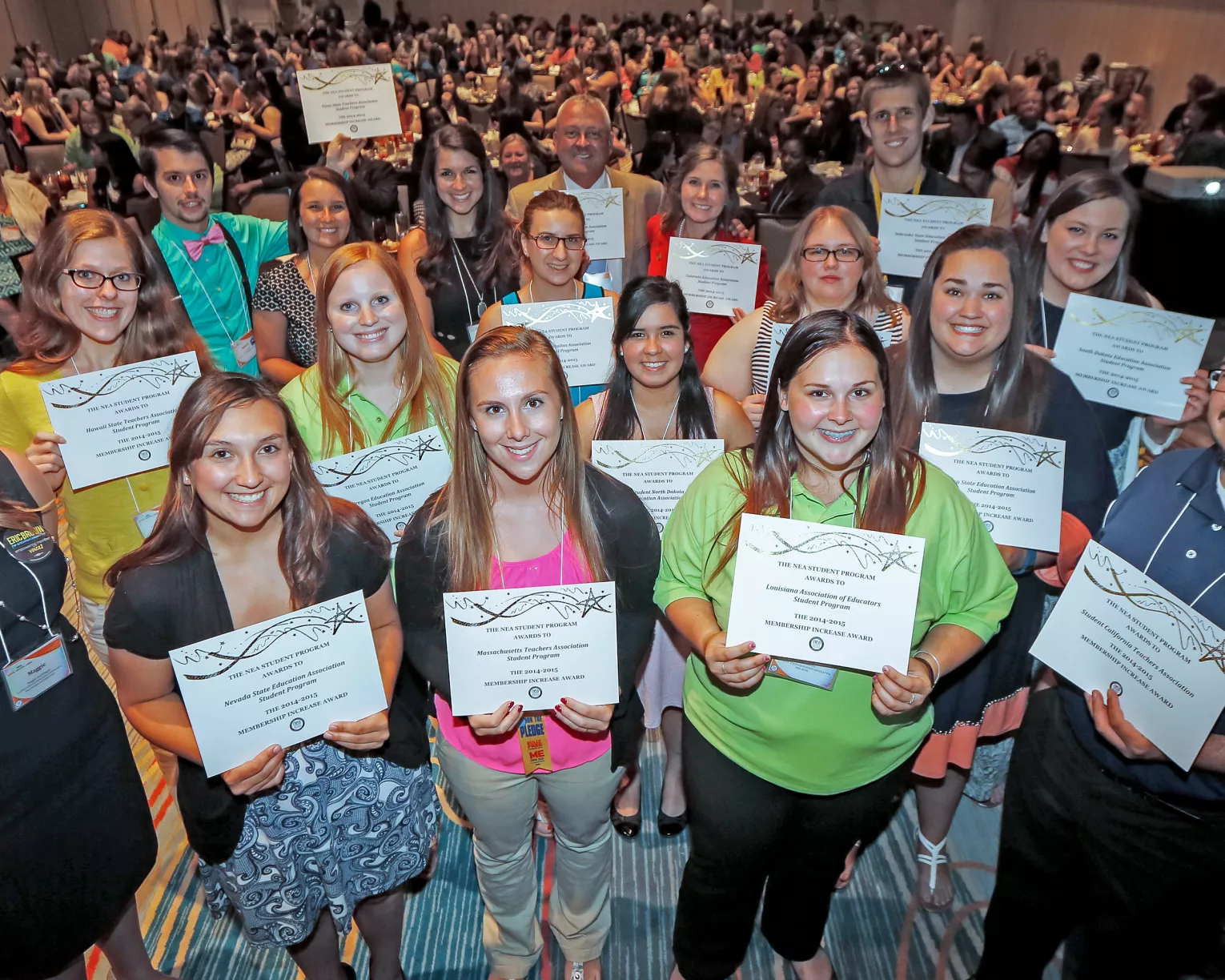NEA’s aspiring educators have shown once again they will be a generation to lead us to a more just society, as proven by the content and character in the group’s first-ever Aspiring Educator (AE) 2020 Virtual Conference.
This year has turned out differently than anyone could have ever imagined—from the coronavirus pandemic and the economic downturn to the continued attacks on Black bodies—and the four-day event was shaped to rise to these extreme conditions with a focus on community building, self-care, professional learning, and social justice. Workshops ranged from more traditional topics and sessions, including surviving your first few weeks as a new educator and navigating the Student Loan Forgiveness program to guided meditation and Zumba workouts.
Social and racial justice topics took center stage. And fairly so, given that within a few months, the world saw egregious attacks on Black Americans, from Ahmaud Arbery and Breonna Taylor to George Floyd and the two Black transgender women, Riah Milton in Ohio and Dominique “Rem’mie” Fells in Pennsylvania, who were killed one day apart from each other. Plus, those that go untelevised, ignored, excused, or denied.
“Right now we’re facing the most surreal combination of tragedies imaginable,” said NEA President Lily Eskelsen García during her virtual address to the nation’s future educators. “Our union is connected [to it because] it impacts our students, our families, [and] our communities.”
“We don’t have a magic wand,” she added, “but we do have power.”
This year’s AE conference (and actions throughout the year!) helped grow this power for a better world with sessions such as creating inclusive schools and safe spaces for all identities; learning how to be intentional about racial and social diversity inclusion in instruction and community; decolonizing classrooms using a Native American perspective to promote inclusion and equity; and more.
Hard questions were asked about race and opposing thoughts were respectfully challenged.
“We are operating in an education system that was never meant for Black and Brown children since its inception,” said Erika Strauss Chavarria, a high school Spanish teacher in Maryland, during her session on “Racial and Social Justice in Classrooms,” underscoring that one of the most important actions an aspiring educator can take is to understand how the practice and policy adopted in classrooms could potentially harm students and “what you’re going to do to not contribute to that harm,” she said.
While many tough conversations were had, there was much to celebrate, too. Throughout the year, AE members from across the country worked tirelessly to organize members, particularly on the college campuses that serve students of color. These efforts have contributed to identifying the best ways to recruit educators of color and the resources they need to become lifelong active educators and union leaders. They have also participated in community service events, held professional development sessions and career-prep workshops, remodeled schools, marched in rallies, lobbied their legislators, and used their bodies and voices to demand justice for Black lives.
NEA Chair Gives Final Address
Rachel Immerman of Kentucky has led the AE program since 2018, when she was elected to the more than 40,000-member group, which represent 1,100 college and university chapters in 50 states. During her victory speech then, she said, “As NEA Aspiring Educators Chairperson, I look forward to collaborating with educators and unifying our voices to protect and enhance the promise of public education.”
And Immerman held true to her words by working with AE members to create a distributive leadership culture that encourages members and leaders to “unite and welcome everyone,” she says and gives much credit to those who took an active role in the union.
“All members have an opportunity to be a leader, an organizer, and a creative visionary for this organization,” she explained. “If you have helped host an event…led a game night, mentored an emerging leader, crafted an NBI…thank you for stepping up into leadership in a way that proves to others that our greatest strength is in fact our members.”
This team effort has led to realizing meaningful work, including an Aspiring Educator Chapter Toolkit. The toolkit was designed to help start and grow campus chapters. It includes history of the AE program; sample constitution, bylaws, and meeting material; communications strategies; leadership planning guides; and more. The toolkit will make its official debut later this summer.
Additionally, more and more aspiring educators have taken on dismantling the culture of white supremacy. The Student California Teachers Association, for example, chose to add “abolishing white supremacy culture” to its organization’s mission. Since then, members have been examining their own experiences in elementary school to recall the pervasiveness of white supremacy culture.
“We must be the generation that dismantles those roles and stigmas,” said Immerman of the white supremacy culture that harms students and educators alike. She underscored that the next generation of aspiring educators must continue to “build and grow our union to reflect the needs of our members, communities, and the students we seek to serve.
“You are going to do even more and continue to build an even stronger, more unified Aspiring Educators Program. You have proven to me that with every step we take, ten more doors open up. I am so honored to have served you for the past years, but my greatest honor is now handing this gift to you. You are now responsible for making this union what we need it to be. You now hold one of the most sacred treasures for aspiring educators and that is the potential of what this program can be: a union of love and support for every single educator prior to them entering the classroom.”
Go to aec2020.weebly.com for a recap of conference highlights.


